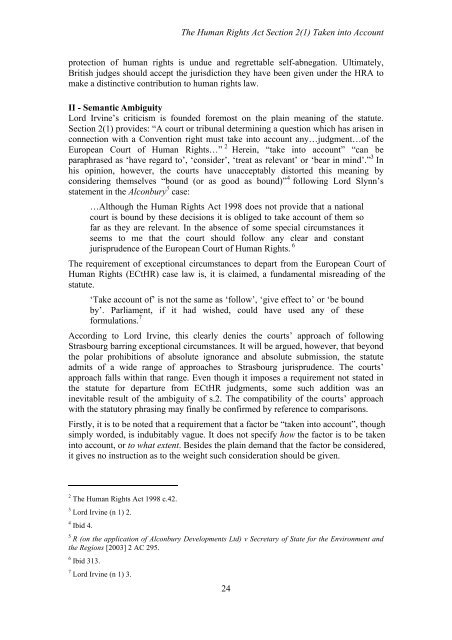Open UKLSR Volume 1(2) - Uklsa
Open UKLSR Volume 1(2) - Uklsa
Open UKLSR Volume 1(2) - Uklsa
You also want an ePaper? Increase the reach of your titles
YUMPU automatically turns print PDFs into web optimized ePapers that Google loves.
The Human Rights Act Section 2(1) Taken into Account<br />
protection of human rights is undue and regrettable self-abnegation. Ultimately,<br />
British judges should accept the jurisdiction they have been given under the HRA to<br />
make a distinctive contribution to human rights law.<br />
II - Semantic Ambiguity<br />
Lord Irvine’s criticism is founded foremost on the plain meaning of the statute.<br />
Section 2(1) provides: “A court or tribunal determining a question which has arisen in<br />
connection with a Convention right must take into account any…judgment…of the<br />
European Court of Human Rights…” 2 Herein, “take into account” “can be<br />
paraphrased as ‘have regard to’, ‘consider’, ‘treat as relevant’ or ‘bear in mind’.” 3 In<br />
his opinion, however, the courts have unacceptably distorted this meaning by<br />
considering themselves “bound (or as good as bound)” 4 following Lord Slynn’s<br />
statement in the Alconbury 5 case:<br />
…Although the Human Rights Act 1998 does not provide that a national<br />
court is bound by these decisions it is obliged to take account of them so<br />
far as they are relevant. In the absence of some special circumstances it<br />
seems to me that the court should follow any clear and constant<br />
jurisprudence of the European Court of Human Rights. 6<br />
The requirement of exceptional circumstances to depart from the European Court of<br />
Human Rights (ECtHR) case law is, it is claimed, a fundamental misreading of the<br />
statute.<br />
‘Take account of’ is not the same as ‘follow’, ‘give effect to’ or ‘be bound<br />
by’. Parliament, if it had wished, could have used any of these<br />
formulations. 7<br />
According to Lord Irvine, this clearly denies the courts’ approach of following<br />
Strasbourg barring exceptional circumstances. It will be argued, however, that beyond<br />
the polar prohibitions of absolute ignorance and absolute submission, the statute<br />
admits of a wide range of approaches to Strasbourg jurisprudence. The courts’<br />
approach falls within that range. Even though it imposes a requirement not stated in<br />
the statute for departure from ECtHR judgments, some such addition was an<br />
inevitable result of the ambiguity of s.2. The compatibility of the courts’ approach<br />
with the statutory phrasing may finally be confirmed by reference to comparisons.<br />
Firstly, it is to be noted that a requirement that a factor be “taken into account”, though<br />
simply worded, is indubitably vague. It does not specify how the factor is to be taken<br />
into account, or to what extent. Besides the plain demand that the factor be considered,<br />
it gives no instruction as to the weight such consideration should be given.<br />
2 The Human Rights Act 1998 c.42.<br />
3 Lord Irvine (n 1) 2.<br />
4 Ibid 4.<br />
5 R (on the application of Alconbury Developments Ltd) v Secretary of State for the Environment and<br />
the Regions [2003] 2 AC 295.<br />
6 Ibid 313.<br />
7 Lord Irvine (n 1) 3.<br />
24


